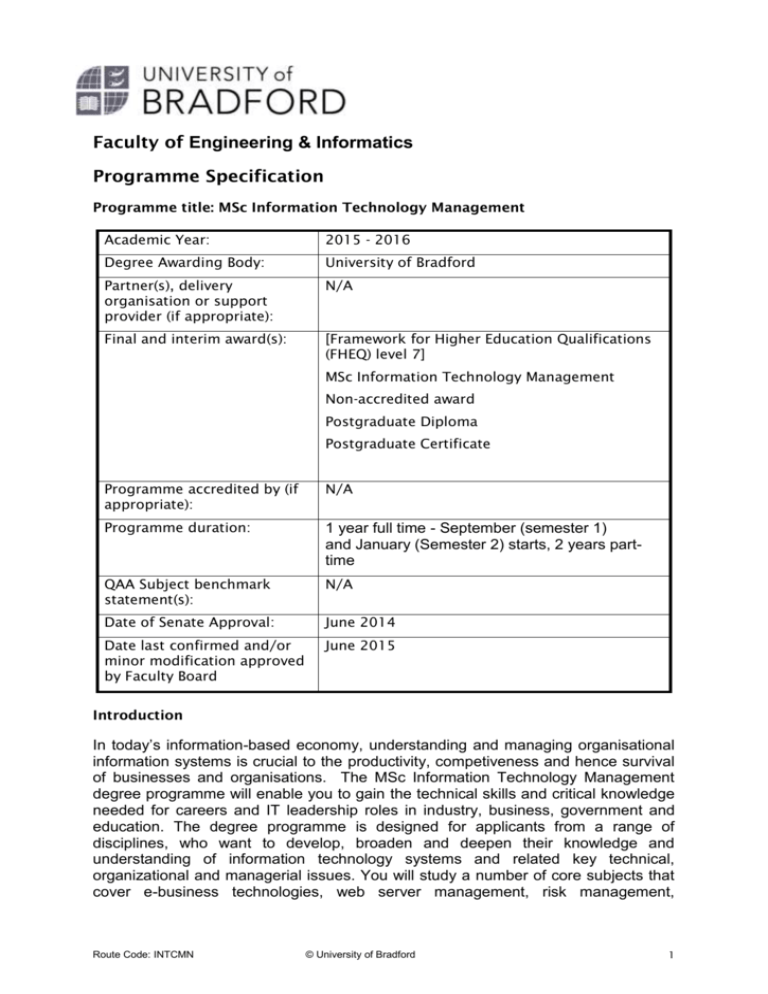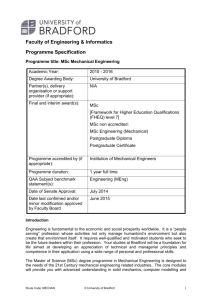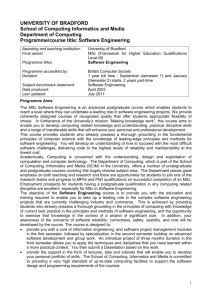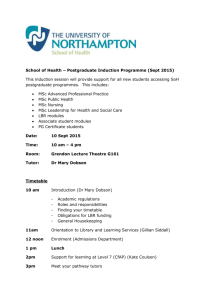MSc Information Technology Management
advertisement

Faculty of Engineering & Informatics Programme Specification Programme title: MSc Information Technology Management Academic Year: 2015 - 2016 Degree Awarding Body: University of Bradford Partner(s), delivery organisation or support provider (if appropriate): N/A Final and interim award(s): [Framework for Higher Education Qualifications (FHEQ) level 7] MSc Information Technology Management Non-accredited award Postgraduate Diploma Postgraduate Certificate Programme accredited by (if appropriate): N/A Programme duration: 1 year full time - September (semester 1) and January (Semester 2) starts, 2 years parttime QAA Subject benchmark statement(s): N/A Date of Senate Approval: June 2014 Date last confirmed and/or minor modification approved by Faculty Board June 2015 Introduction In today’s information-based economy, understanding and managing organisational information systems is crucial to the productivity, competiveness and hence survival of businesses and organisations. The MSc Information Technology Management degree programme will enable you to gain the technical skills and critical knowledge needed for careers and IT leadership roles in industry, business, government and education. The degree programme is designed for applicants from a range of disciplines, who want to develop, broaden and deepen their knowledge and understanding of information technology systems and related key technical, organizational and managerial issues. You will study a number of core subjects that cover e-business technologies, web server management, risk management, Route Code: INTCMN © University of Bradford 1 knowledge management, business intelligence, and research methodologies. In addition, you can choose optional modules that match your specific interests. These include Six Sigma, Project Planning, Mobile applications, advanced networks and security, privacy, and data protection. The programme of study culminates in a dissertation which is an independent piece of research with guidance from a supervisor. Throughout the programme there is emphasis on ethical and sustainability issues of information management in real-life organisations. The MSc Information Technology Management is located in the School of Engineering. The school offers a lively and stimulating learning environment and has currently twelve separate MSc degree programmes and over 200 postgraduate and research students. Depending on their selection of modules, students on the MSc Information Technology Management will also benefit from studying in the School of Management, ranked amongst the world’s top business schools, and in the School of Electrical Engineering and Computer Science which has the oldest computing department in the UK. With reference to teaching and learning, the School aims to produce postgraduates who aspire to challenging careers in industry, commerce and the public sector or to developing their own enterprises. Postgraduates will be able to move directly into responsible roles in employment with a minimum of additional training. These aims are achieved by Providing a supportive, structured environment in which students are encouraged to develop independent learning skills; Developing subject knowledge and understanding, developing discipline skills and developing personal transferable skills, to enable graduates to pursue programmes of further study, or to move directly into responsible employment. Programme Aims The MSc Information Technology Management programme is intended to: A1. Provide students with the advanced theoretical knowledge, concepts and skills necessary for original thought and problem analysis in the management of Information Systems. A2. Provide the knowledge and technical skills that enables students to design, develop and manage Business Information Systems. A3. Provide students with the academic and technical skills necessary to carry out independent research in the design, implementation or management of IT, and to develop sustainable personal learning. A4. Develop personal transferable skills and attributes including report writing, online discussion, presentation, project management and research skills. Route Code: INTCMN © University of Bradford 2 Programme Learning Outcomes To be eligible for the award of Postgraduate Certificate at FHEQ level 7, students will be able to: LO1. Demonstrate an advanced understanding of the concepts, principles and theories underpinning the management of strategic knowledge and sustainable information technologies in organisations. LO2. Critically appraise business intelligence tools and their role in gathering and analysing detailed business information. LO3. Engage in critical analysis of the characteristics of web client, server and linked database technologies. LO4. Demonstrate understanding of advanced Internet, mobile technologies, business software, networks and protocols and apply advanced methods in the high-level security, privacy, legal and organisational impact of trading over the Internet. LO5. Critically evaluate the principles and practices of risk management and appraise the conditions for its successful implementation. LO6. Acquire skills to deal with the complex issues involved in effectively implementing electronic systems in business whilst identifying and minimising the security risks. Additionally, to be eligible for the award of Postgraduate Diploma at FHEQ level 7, students will be able to: LO7. Demonstrate a systematic understanding and knowledge of strategic management, particularly in the light of major contemporary debates such as those focused on business stakeholders, business ethics, corporate social responsibility, and sustainable development. LO8. Take a holistic approach in solving problems and designing systems, applying professional judgements to balance risks, cost, benefits, safety, reliability and environmental impact. Additionally, to be eligible for the award of Degree of Master at FHEQ level 7, students will be able to: LO9. Select, design, plan and manage a self-directed and managed researchinformed project; LO10. Demonstrate research skills for further detailed investigation, of complex nonroutine problems, demonstrate critical thinking; evaluate and integrate scientific, technological and business/managerial information from a variety of sources. Curriculum The programme structure is shown in the table below. The MSc Information Technology Management covers a range of specialist topics, leading to the Route Code: INTCMN © University of Bradford 3 qualification of a Master's degree. Typically, a taught full-time Master's programme lasts for twelve months of full-time study. The programme has two stages: the taught programmes stage which takes place during the first two semesters (or four semesters for the part-time route), and the project/dissertation stage. The taught programmes stage is organised on a modular basis. Students who successfully complete the taught modules are eligible for the PGDip Information Technology Management. Students proceeding onto the Masters level undertake a project which the student has to agree with the supervisor. Effective for 2015/16 Postgraduate Certificate Module Code Module Title Type Credits Level Study period ENG4053D Web and Server Management C 20 7 1 ENG4089M Supply Chain Management O 10 7 1 CM-1052D Security, Privacy, and Data Protection O 20 7 1 ENG4100M Mobile Applications Technologies O 10 7 1 ENG3048M Six Sigma for Business Excellence O1 10 6 1 MAN0208M Understanding Strategic Management O 10 6 1 Students will be eligible to exit with the award of Postgraduate Certificate if they have successfully completed 60 credits and achieved the award learning outcomes. Postgraduate Diploma Module Code Module Title Type Credits Level Study period ENG4003M E-Commerce Technologies C 10 7 2 ENG4019M Research Seminar Series C 10 7 2 ENG4072M Risk Management C1 10 7 2 ENG4065M Knowledge Management & Business Intelligence C1 10 7 2 ENG4108M Advanced Networking Protocols O 10 7 2 MAN4317M Information Systems Planning for Sustainability O 10 7 2 ENG3049M Reliability Engineering O 10 6 2 ENG3011M Corporate Strategy and Engineering Management O 10 6 2 Route Code: INTCMN © University of Bradford 4 Students will be eligible to exit with the award of Postgraduate Diploma if they have successfully completed at least 120 credits and achieved the award learning outcomes. Degree of Master Module Code ENG4013Z Module Title Type Credits Level Study period MSc Project C 60 7 3 Notes to the Curriculum: 1. Students are able to choose option modules (O1), except where these have already been taken as part of a previous University of Bradford undergraduate programme. In this event, the Director of Studies will identify an appropriate substitute module(s). 2. Only 20 credits of Level 6 material can be taken in entirety of the MSc degree. Effective for 2016/17 Postgraduate Certificate Module Code Module Title Type Credits Level Study period ENG4053D Web and Server Management C 20 7 1 ENG4319D Supply Chain Management C 20 7 1 CM-1052D Security, Privacy, and Data Protection C 20 7 1 Students will be eligible to exit with the award of Postgraduate Certificate if they have successfully completed 60 credits and achieved the award learning outcomes. Postgraduate Diploma Module Code Module Title Type Credits Level Study period ENG4311M Research Skills C 10 7 2 ENG4072M Risk Management C 10 7 2 ENG4318D Knowledge Management & Business Intelligence C 20 7 2 SOE43xxD Electronic Commerce C 20 7 2 Route Code: INTCMN © University of Bradford 5 Students will be eligible to exit with the award of Postgraduate Diploma if they have successfully completed at least 120 credits and achieved the award learning outcomes. Degree of Master Module Code ENG4013Z Module Title Type Credits Level Study period C 60 7 2 MSc Project Notes to the Curriculum: 3. Students are able to choose option modules (O1), except where these have already been taken as part of a previous University of Bradford undergraduate programme. In this event, the Director of Studies will identify an appropriate substitute module(s). 4. Only 20 credits of Level 6 material can be taken in entirety of the MSc degree. Students will be eligible for the award of Degree of Master if they have successfully completed at least 180 credits and achieved the award learning outcomes. Learning, Teaching and assessment Strategy January Start programmes For the January start programme the semester numbers correspond to the position in the academic year not the order of which they are taken. So January-start students will take “Semester 2” modules first, followed by “Semester 1” modules. Programme Routes PgDip September Start MSc January Start MSc Semester 1 Semester 1 Semester 2 Semester 2 Semester 2 PgDip Summer Project Summer Project MSc Semester 1 MSc Teaching and Assessment Strategies Teaching involves a combination of formal lectures, seminars, group discussion board, directed reading, and guest lectures by practising professionals. In general, the programme aims to integrate applied and theoretical knowledge with assessment Route Code: INTCMN © University of Bradford 6 processes that test both knowledge of the disciplines as well as their application and limitations. Practical programming skills are developed in computer laboratory sessions. For every 10 credits on the programme, you will be required to commit 100 hours of study. Some of these hours will be formally timetabled - lectures, seminars, tutorials and computer programming workshops – and others will involve you in carrying out private study. Methods of assessment are similarly varied and progress will be assessed using a mix of formal examinations, presentations and seminar papers, reports, essays, coursework assignments, and software projects. The appropriate method is chosen so that you may demonstrate the particular learning outcomes of each module. In addition to 120 credits of taught modules, candidates for the Masters award will be expected to complete a 60 credit project/dissertation, which will be overseen by an individual supervisor. The School is committed to Education for Sustainable Development and endeavours to integrate ESD wherever possible into the curriculum, and you are free to explore ethical and environmental issues in your project work, should you wish to. Assessment Regulations This Programme conforms to the standard University Taught Postgraduate Regulations, which are available at the link below: http://www.bradford.ac.uk/aqpo/ordinances-and-regulations/ Admission Requirements The University welcomes applications from all potential students regardless of their previous academic experience; offers are made following detailed consideration of each individual application. Most important in the decision to offer a place is our assessment of a candidate’s potential to benefit from their studies and of their ability to succeed on this particular programme. Entrance requirements for each programme will vary but consideration of your application will be based on a combination of your formal academic qualifications and other relevant experience. If you have prior certificated learning or professional experience which may be equivalent to parts of this programme, the University has procedures to evaluate this learning in order to provide you with exemptions from specified modules contained within the curriculum. Please talk to us if you do not fit the standard pattern of entry qualifications. We are continually reviewing and developing our practices and policies to make the University more inclusive, but if you are disabled we may need to make some adjustments to make sure that you are not disadvantaged. We would advise you to contact the programme leader before you apply to discuss these. Applicants are expected to hold a good honours degree in a related subject. However, the academic discipline of your first degree is less important, as the programme is designed for graduates from a wide range of backgrounds. Personal Route Code: INTCMN © University of Bradford 7 motivation and the commitment to succeed are seen as key attributes in the admissions process and the School treats each application on an individual basis. Mature applicants with educational qualifications other than an Honours degree will be considered on an individual basis. The University of Bradford has always welcomed applications from disabled students, and these will be considered on the same academic grounds as are applied to all applicants. If you have some form of disability you may wish to contact the programme leader before you apply. English Language Requirements All students must satisfy the English language requirements for admission as described in http://www.brad.ac.uk/international/before-you-apply/english-languagerequirements/. A test of written and spoken English normally needs to have been passed at grade 6.0 for IELTS or 550 for TOEFL (or 220 for the computer-based test) Applications are welcome from students with non-standard qualifications or mature students (those over 21 years of age on entry) with significant relevant experience. Recognition of Prior Learning If applicants have prior certificated learning or professional experience which may be equivalent to parts of this programme, the University has procedures to evaluate and recognise this learning in order to provide applicants with exemptions from specified modules or parts of the programme. Minor Modification Schedule Version Number 1 Route Code: INTCMN Brief description of Modification Date of Approval (Faculty Board) For 2016-2017, Supply Chain Management moved to sem 2 and Electronic Commerce moved to sem 1 to allow January entry in 2016. © University of Bradford 8



